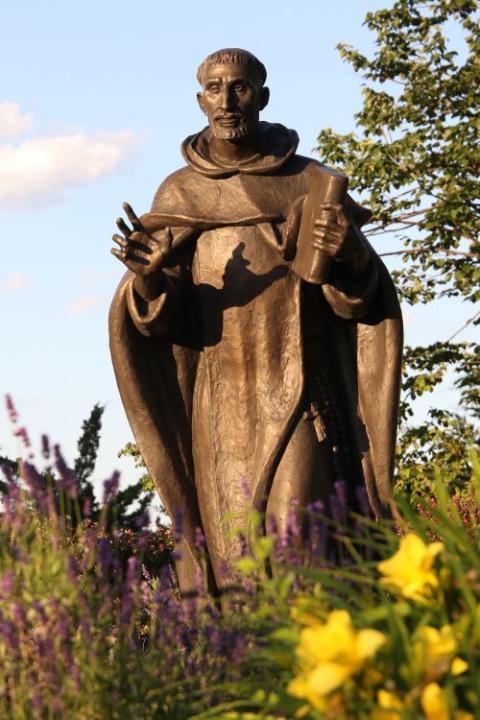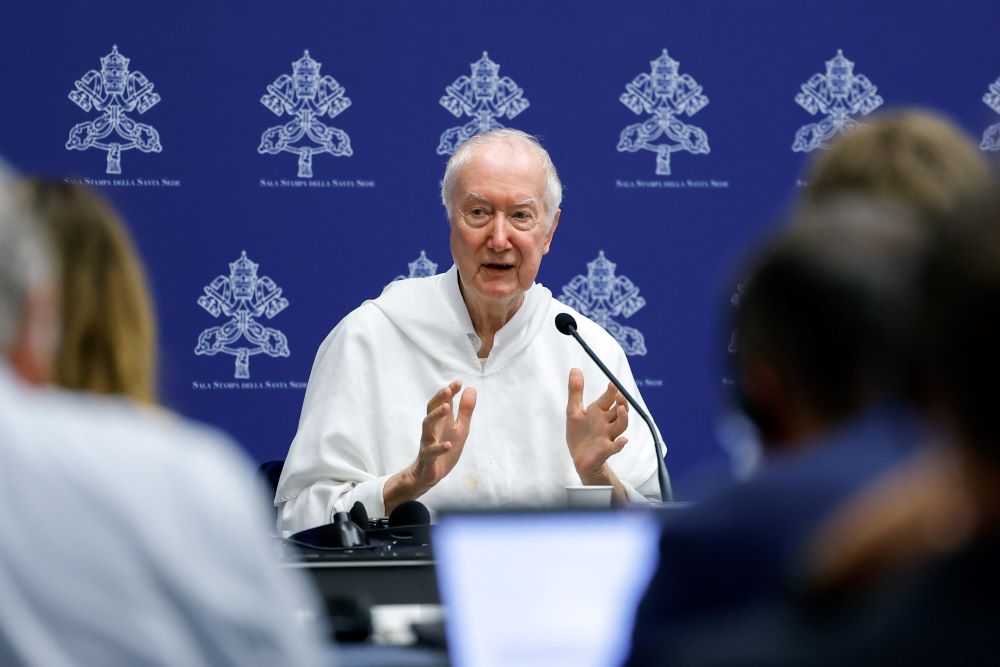
Dominican Fr. Timothy Radcliffe, spiritual adviser to the assembly of the Synod of Bishops, speaks at a Vatican briefing Oct. 27, 2023. He will reprise that role when the synod on synodality continues Oct. 2-27. (CNS/Lola Gomez)
Tensions were high inside the Vatican press room in October as Pope Francis' high-stakes summit on the future of the church barreled toward its close, when a correspondent representing a right-wing website that had spent the month warning that the gathering was about to abandon long-standing church teaching took to the microphone.
The correspondent began his question to Dominican Fr. Timothy Radcliffe by referencing comments the priest had made some 20 years prior, asking if he stood by his assessment that it would be "unacceptable" if the Vatican banned the admission of homosexuals to the seminary. Subsequent church documents, the writer said, "very clearly" banned "anyone with homosexual tendencies from entering the seminaries."
The British priest had been tapped by the pope to serve as the spiritual father of the synod on synodality, where a number of issues once considered taboo in church life — the role of women, welcoming LGBTQ Catholics, clergy abuse and much more — had been put on the table for discussion. Some Catholics held high expectations that change was on the horizon, while others were anxious for the same reason.
"What I argued then and what I argue now is that if anyone is going to embrace a celibate lifestyle, their sexual identity, their sexual orientation should not be the most important part of their identity. And that is true whether they are homosexual or heterosexual," replied an unfazed Radcliffe.
"Now if you had someone who had an unhealthy focus on their heterosexual orientation and said this is the center of what it means to be human," he continued in a non-defensive manner, "then we may have doubts whether they could really serve as a celibate priest, too."
'At the heart of good synodality is that you actually give the other space to disagree with you, that you help them disagree with you.'
—Fr. Timothy Radcliffe
Radcliffe had effectively turned the reporter's question on its head. The moment hearkened back to the scene from the Gospel of Luke when Jesus healed a man on the Sabbath. Legal scholars had been closely scrutinizing Jesus' behavior and were curious if he would abide by their interpretation of the law that restricted certain Sabbath activities.
"Who among you, if your son or ox falls into a cistern, would not immediately pull him out on the Sabbath day?" Jesus asked, as the Gospel recounts. "But they were unable to answer his question."
For Radcliffe, such questions — even if complicated — can be clarifying.
And for nearly 50 years, both in his native England and traveling the world as the head of the Order of Preachers, Radcliffe — now 78 — has garnered a reputation as a spiritual authority, unafraid of asking the difficult questions and challenging underlying assumptions.
In a different era, that disposition earned him the ire of high-ranking Vatican officials that sought to marginalize his voice at past synods and likely blocked him from several top jobs inside the church. Now, Francis — a pope that has staked his legacy on reviving a pastoral style of theology that isn't solely concerned about the law, but is focused on meeting people where they are in life — has entrusted Radcliffe to set the spiritual tone for his ambitious project of synodality. But it comes at a moment when both leaders are battling health challenges, mounting internal resistance within their respective domains and wrestling in real time with how to navigate the challenges of a deeply divided church in an equally polarized world.
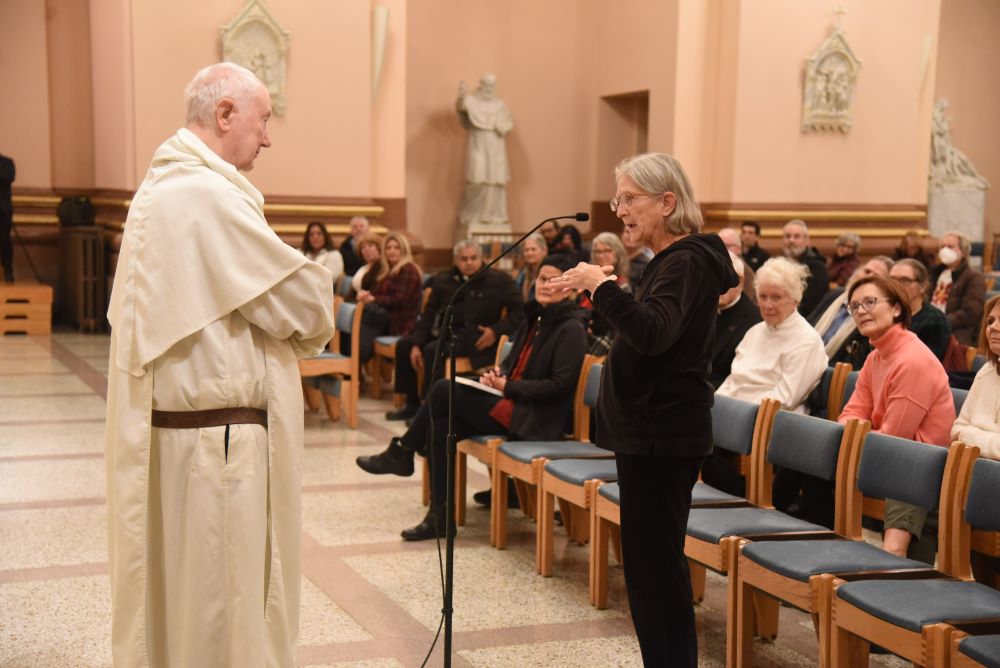
Lucy Robie, a member of St. Thomas the Apostle Parish in Fortville, Indiana, asks a question of Dominican Fr. Timothy Radcliffe at Sts. Peter and Paul Cathedral in Indianapolis Dec. 6, 2023, after the priest gave a presentation on the synod on synodality as part of a tour of U.S. cities. (OSV News/The Criterion/Sean Gallagher)
Looking ahead to the concluding session of the synod Oct. 2-27, Radcliffe believes the "synodal adventure will prove to be deeply transformative of the body of Christ."
How the journey ends and what steps are next are unclear to the British Dominican, as they are for much of the church. But unexpectedly — though joyfully — Radcliffe has found himself at the heart of the adventure.
'Orthodoxy is spacious'
When people first encounter Radcliffe, a product of one of England's storied aristocratic families, it's his simplicity they often find most striking.
In a 1999 book, he recalled a conversation with a Benedictine great-uncle who seemed perplexed by the idea of him joining the Dominican order. " 'Are you sure that is a good idea? Aren’t they supposed to be rather intelligent?' " Radcliffe remembered him asking. "Then he paused and said, 'No, come to think of it, I have known lots of stupid Dominicans.' "
Those who know Radcliffe or are familiar with his work will attest that the Oxford-trained theologian and Scripture scholar is hardly unintelligent. But, he is often self-deprecating, usually a bit disheveled in appearance and always in good humor.
On an early spring day this year, I visited Radcliffe at his home in the Blackfriars community in Oxford, where he once served as prior. He had traded his traditional white Dominican habit for a well-worn forest green jumper and khaki trousers. He had just returned from a walk and among the topics he had been thinking about: the retreat reflections for the upcoming synod assembly at the Vatican.
"I'm like a cow, I need to ruminate. Feed things in, digest, go back, prune," he told me.
Just a few days earlier, the head of the synod office, Cardinal Mario Grech, had phoned Radcliffe to formally invite him to lead the exercises again this fall. There was little doubt, given the widespread acclaim the synod retreat that he led last fall had received, that he would be invited to return.
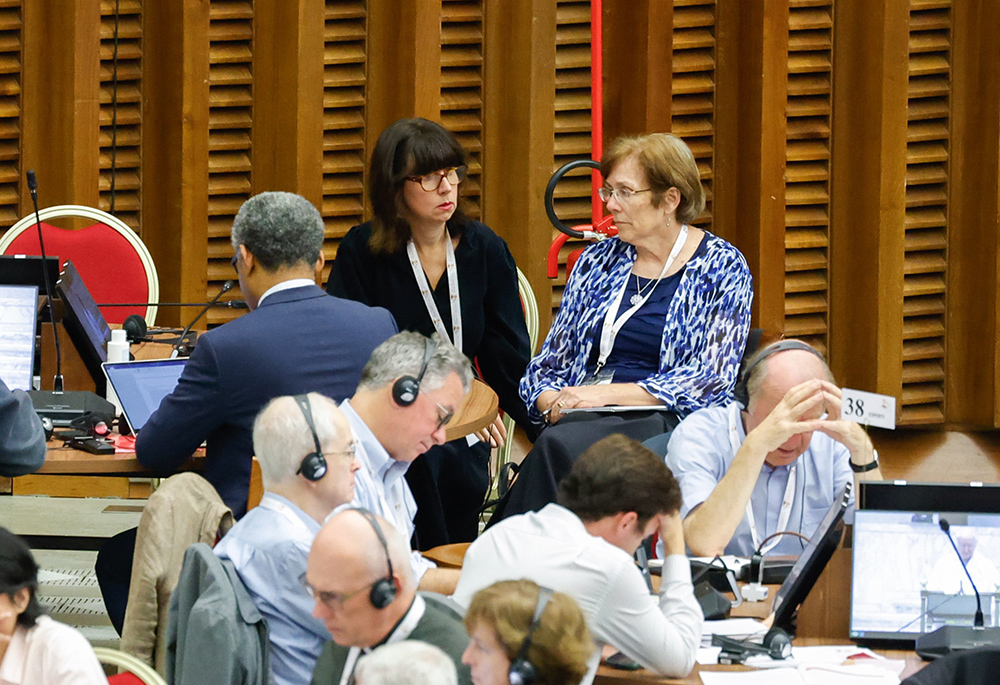
Anna Rowlands, left, a theologian from England, attends a working session of the assembly of the Synod of Bishops in the Vatican's Paul VI Audience Hall Oct. 18, 2023. (CNS/Lola Gomez)
During a public lecture at Cambridge University in April, British theologian and synod adviser Anna Rowlands observed that Radcliffe's opening synod retreat had been the most successful element of the monthlong synod. She said the retreat "framed an openness to the entire process" and built trust among attendees.
"Of course, not every hope or opinion is legitimate," Radcliffe told delegates at the start of the assembly. "But orthodoxy is spacious and heresy is narrow."
When the synod drew to a close in October 2023, Radcliffe warned participants that when they returned home, they would likely be pressed about some of the major debates that had surfaced during the assembly and asked "Whose side are you on?"
"We shall need to be profoundly prayerful to resist the temptation to succumb to this party-political way of thinking," he cautioned. "That would be to fall back into the sterile, barren language of much of our society. It is not the synodal way."
In some respects, it's the combination of his belief that disagreement within the church can be healthy and his conviction that everyone can and should have a voice that makes him a natural fit for the synodal process — something he attributes to his formation as a Dominican.
"At the heart of good synodality is that you actually give the other space to disagree with you, that you help them disagree with you," he told me. "The role of prior is to help those who disagree with the majority to speak."
But, he added: "I don't think that's a skill that many of us have in the church."
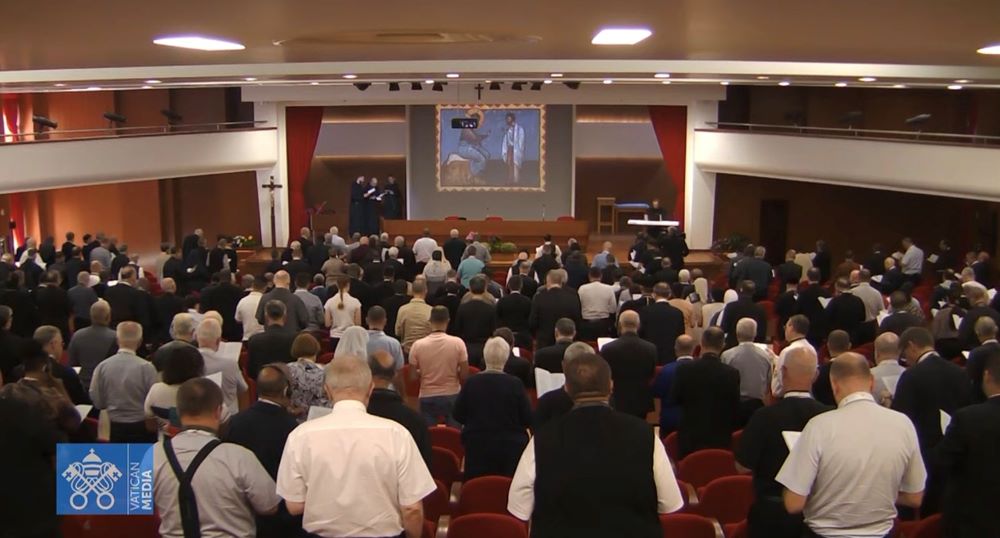
Members of the assembly of the Synod of Bishops recite morning prayer during their retreat outside of Rome in this screen grab from Oct 2, 2023. Dominican Fr. Timothy Radcliffe is planning the retreat for the final session of the synod on synodality in October. (CNS/Vatican Media via YouTube)
In preparing for the first synod retreat, Radcliffe spent much of his time largely drawing from his experiences as master of the Dominican order.
"The question was: What's going to stop people talking," he said. "Many of the people in the church are not trained to listen."
Key to this, he continued, is helping people expand their imagination so their own preconceptions can be challenged.
"Can we imagine the person with whom we're talking, can we imagine what they've lived, and what they've loved and what they've suffered?" he asked. "Or are we locked into our own personal bubble?"
Fruitful tensions and friendship
When Radcliffe became the 85th successor of St. Dominic in 1992, he took over as head of the global Dominican order at a time when it found itself a difficult fit for Pope John Paul II's style of governance, where collegiality among the church's hierarchy was limited and rooting out supposed heresies was its modus operandi.
Fr. James Alison, a former Dominican priest, recalled working as a translator at the general chapter when Radcliffe was elected.
"It was a huge relief, because he seemed to be someone able to talk like an ordinary person about the real issues that people face," said Alison. But that quickly put him at odds with those in the Vatican, he said, because Radcliffe was "willing to talk about things John Paul didn't want people to talk about."
During his time as master, Radcliffe lived for nine years at the Dominican headquarters in Rome and participated in three Synods of Bishops.
"They were very tedious. You had the ecclesiology of hats," he recalled with a mischievous smile. "The white one at the front, a couple rows of red ones and then you had the unhatted."
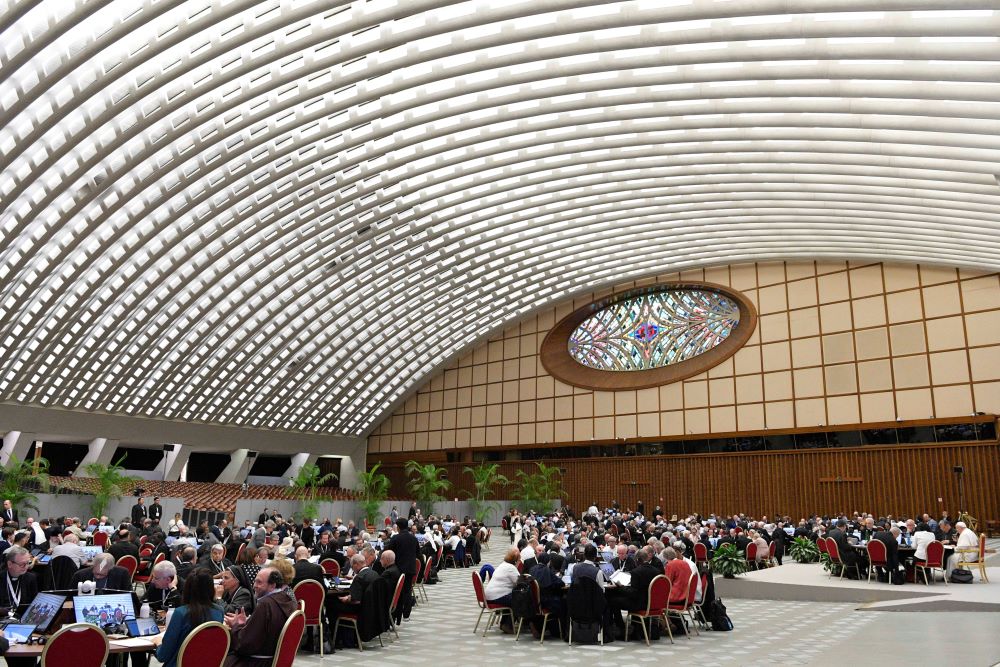
The synod on synodality has changed its format, gathering clergy and laity at roundtables rather than stadium seating for cardinals used at previous synods. Here, participants in the 2023 assembly gather Oct. 25 for an afternoon session in the Paul VI Audience Hall at the Vatican. (CNS/Vatican Media)
Past synods have taken place in the Vatican's synod hall, which utilized stadium style seating with the pope facing a few rows of cardinals, followed by the bishops and other delegates. But the synod on synodality has revamped the entire process, using roundtables where clergy and laity sit side by side with an equal voice and equal vote.
And it wasn't just the seating arrangement that made people nervous. Throughout the first assembly, some delegates said that the participation of the laity meant it wasn't a true synod of bishops.
For Radcliffe, who held the unenviable job of trying to hold all the tensions together in a fruitful manner, the theme he repeatedly returned to throughout the month was friendship.
"If friendship is a sharing in the friendship which is the life of God, according to Aquinas, then that is an equal love," he told me, drawing on the thought of his order's most favorite son. Friendship, he repeats, means equality.
During one synod retreat meditation, Radcliffe told the story of being stranded in the Ivory Coast awaiting a flight to Angola.
"I sat in the dark with our Dominican students, sharing a beer and talking easily about what was dearest to us. We delighted in the pleasure of being different, of having different imaginations," he said. "The delight in difference!"
Later, he voiced disappointment that synod delegates weren't living in the same space together for the entire month in order to share meals, late night conversations and the chance to simply enjoy the pleasure of getting to know one another through shared laughter and tears.
If synodality is to take root, he insists, the church must find more ways to embrace the sheer love of conviviality. And those who know Radcliffe well are quick to cite the way he models this in his own life through humor, warmth and a knack for friendship that is contagious.
Alison remembered living next door to him for a stint at Blackfriars and frequently having to go into Radcliffe's room to collect all the mugs that had ended up there from the number of visitors stopping by for tea.
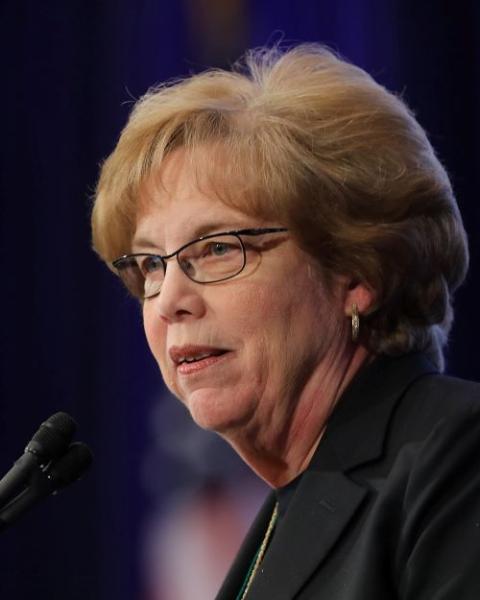
Dominican Sr. Donna Markham is former president and CEO of Catholic Charities USA. (CNS photo/Bob Roller)
Dominican Sr. Donna Markham, former president and CEO of Catholic Charities USA, recalled when Radcliffe traveled to Iraq in the late '90s in the midst of a British and American bombing campaign in order to be close to the Dominican brothers and sisters there.
Friendship required an act of solidarity, said Markham, who later visited Iraq several times. "I know what a powerful sign of hope he was to the Dominicans who were living in the beginning of a church under persecution," she said. "But Timothy has done that all over the world."
This ease of friendship and the delight in difference has extended well beyond the confines of his own Catholic community.
Rowan Williams, former archbishop of Canterbury, recalled as a student at Oxford in the '70s encountering Radcliffe, along with a "remarkable generation of young Dominicans, taught by an equally remarkable generation of older Dominicans."
"These were people who had very fully absorbed the robust humanist theologies of the post-war period — deeply entrenched in patristic and medieval perspectives but also engaged just as deeply in the philosophical, psychological and social issues of the day," he said. "As an Anglican graduate student with strong Catholic affinities, I relished the conversations I shared at Blackfriars, and they played a significant role in shaping my own sense of what good theology was like."
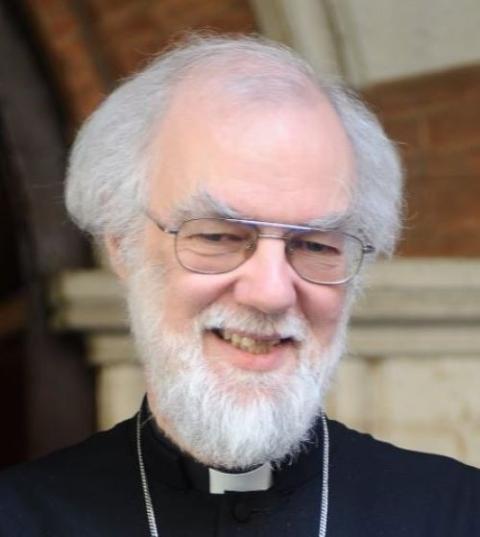
Rowan Williams, former archbishop of Canterbury, met Dominican Fr. Timothy Radcliffe when he was a student at Oxford in the 1970s. (CNS photo/Catholic Press/Giancarlo Giuliani)
Williams said Radcliffe has remained a friend over the years and the two men share a vision of what the church is meant to be.
"Timothy has always had a rare gift for focusing on the fundamentals, believing that the best defense of Catholic truth is simply in showing how deeply and richly it could resource complex contemporary debates — not in obsessive efforts to secure every detail of traditional approaches," said the former head of the Anglican Communion.
Williams would go on to invite Radcliffe to serve as a consultant to the Lambeth Conference of 2008 and, and later chose Radcliffe's book, Why Go to Church? as the Archbishop of Canterbury's Lent Book in 2009.
Reflecting on Radcliffe's ecumenical contributions, particularly at the Lambeth Conference, Williams said that he "showed us all a little of what spiritual authority looked like — not the authority of hierarchy but the authority of wisdom, the fusion of the pastoral and the reflective that is so central to the Dominican identity."
'What (Fr. Timothy Radcliffe) represents is a recognition that we actually have to talk to one another and not just take up positions, which is what synodality is all about.'
—Lord Christopher Patten
Lord Christopher Patten, who served as governor of Hong Kong from 1992 to 1997 and is the current chancellor of the University of Oxford, said that one of his first acts after taking over the role in 2003 was to award Radcliffe an honorary doctorate.
He went on to describe a recurring conference he had organized with a group of British and Italian politicians, academics and business leaders. During one gathering he invited Radcliffe to take part in the proceedings.
"Timothy asked if he could say Mass on Sunday," Patten said. ''Normally, the Mass would be attended by three people. This time it was a full crowd. All of them turned up, and it was his personality that brought them into church."
He continued: "What he represents in the present environment in the church is a recognition that we actually have to talk to one another and not just take up positions, which is what synodality is all about."
On women, LGBTQ questions and priestly formation
Throughout the ongoing multiyear synod process, few themes have caused more consternation and discussion than those of the role of women's leadership in the church, the question of how the church might become more welcoming of LGBTQ people and how to form the church's future priests.
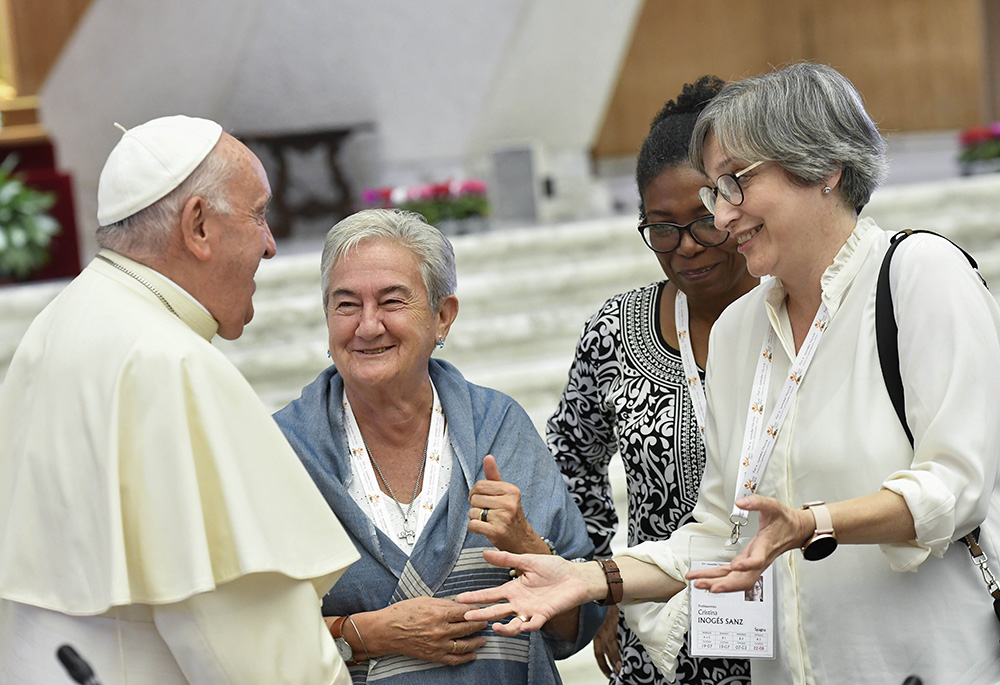
Pope Francis shares a laugh with some of the female members of the assembly of the Synod of Bishops, including Spanish theologian Cristina Inogés Sanz, left, at the assembly's session Oct. 6, 2023, in the Paul VI Audience Hall at the Vatican. Women and laity were voting members of the synod assembly for the first time in 2023. (CNS/Vatican Media)
During his synod addresses, Radcliffe refrained from staking out hardline positions on some questions that had surfaced — such as ordination, the diaconate, gay blessings — but he did insist that synod participants wrestle with what they were hearing.
"Many of us wept when we heard of that young woman who committed suicide because she was bisexual and did not feel welcomed. I wept," Radcliffe told the assembly last October. "I hope it changed us."
On the role of women, Radcliffe used his reflections to challenge synod delegates to consider the "prophetic voice of women," adding that they are "still often seen as guests in their own house."
Dominican Sr. Barbara Reid, president of the Catholic Theological Union, recalled meeting Radcliffe three decades ago when he was visiting Chicago — an encounter that would develop into a long-lasting friendship.
"It makes a huge difference in the formation of men religious and clergy if they have close women friends," said Reid. "They care about them, they listen and they understand our experience and they choose to walk with you."
Radcliffe, she said, is someone who has cultivated close relationships with women and used those friendships to inform his own ministry.
"He's one of those truly valued companions on the journey who knows that his experience is not the same as we women and he knows that he has certain privileges that we don't have that are simply on the basis of sexism and clericalism and he understands that he benefits from that system," she said.
"He knows our experience will never be the same as ours, but at the same time he has a heart to be able empathize with what we experience and then be a voice with us and knows that he has a platform where his voice carries a lot of weight and he can use that to our benefit and to the church's benefit," Reid added.
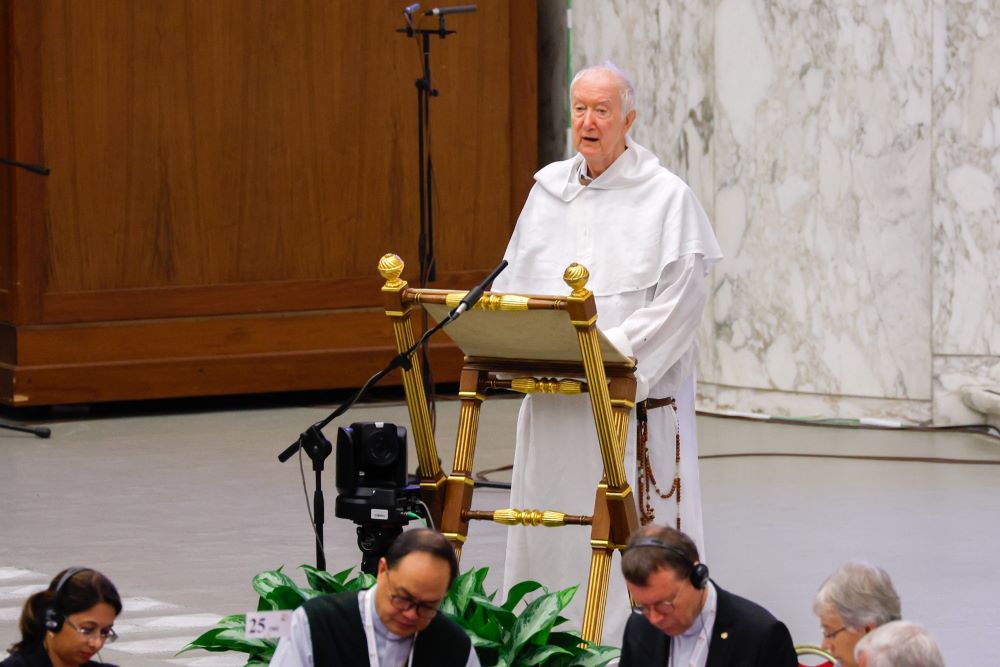
Dominican Father Timothy Radcliffe, spiritual adviser to the assembly of the Synod of Bishops, addresses the gathering in the Vatican's Paul VI Audience Hall Oct. 23, 2023. He will reprise the role at the second assembly of the synod on synodality, which will take place Oct. 2-27. (CNS/Lola Gomez)
Both Reid and fellow Dominican Sr. Markham highlighted Radcliffe's view of the priesthood as rooted in service as being essential to thinking about the future formation of clergy, something the pope repeatedly raised during the synod.
Markham recalled a moment in 2017 when she had invited Radcliffe to deliver the keynote address for the Catholic Charities USA annual conference in Houston, Texas. The area had recently been hard-hit by hurricanes, and organizers discussed whether the conference should take place.
In the end, Markham decided that they would hold Radcliffe's address and then focus on serving the recovering community.
"Timothy delivered the keynote then rolled up his sleeves and went to muck out houses in the very poor areas of Houston along with the rest of us," she recalled. "It's from that kind of walking with people that his preaching takes shape and form from the lived experience of those who are suffering."
I asked Radcliff how this might translate into a renewed vision of the priesthood.
"The challenge is surely to offer a positive, affirmative vision of the priesthood which is not clericalist," he replied.
"I became a priest hearing confessions," he continued, citing the British detective TV show Father Brown. "He was once asked 'How did you solve all of those murders?' 'Because I committed them all myself,' " the detective replied.
"That's what you learn in the confessional: You've done it all yourself or at least thought of it," Radcliffe said.
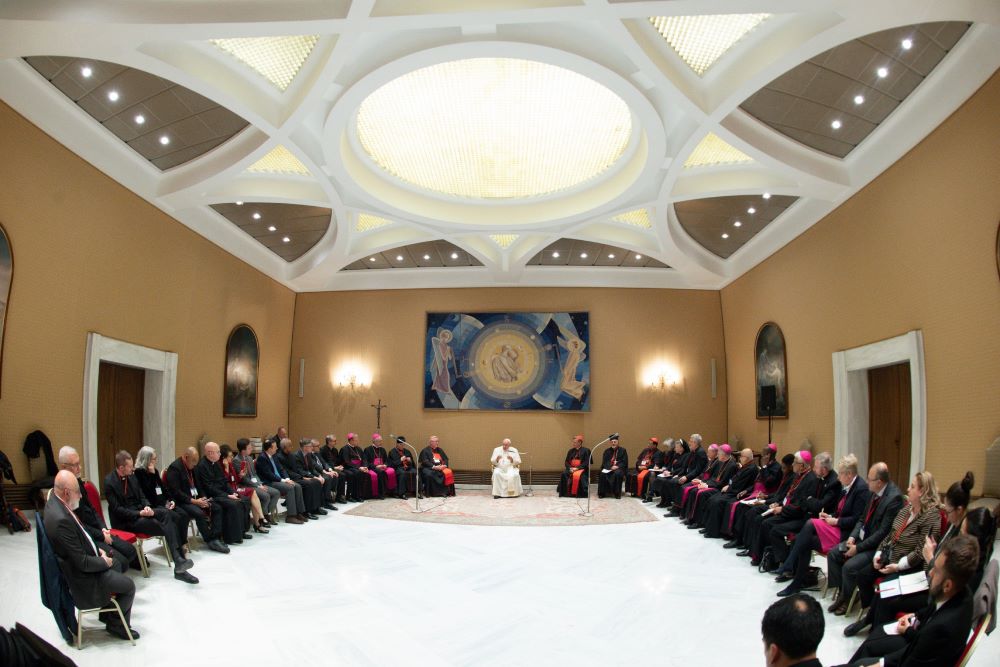
Pope Francis leads a meeting with the presidents and coordinators of the regional assemblies of the Synod of Bishops at the Vatican Nov. 28, 2022. The second, and final, meeting of the synod on synodality is Oct. 2-27. (CNS/Vatican Media)
As LGBTQ concerns, women and other neuralgic topics have been discussed during the synod, tensions have continued to increase. During last October's meeting, a handful of delegates stormed out of the synod hall rather than sit next to those they disagreed with on these topics.
Thinking back to these moments, Radcliffe said, in his experience, "when you hold convictions that you realize you can't entirely justify, then you will be nervous of disagreement."
In navigating this sort of environment, Reid said she believes Radcliffe is relying on the Dominican tradition of disputatio. The concept dates to St. Dominic, who founded the order in the 13th century.
"What we Dominicans take away from this is not trying to convince someone of the rightness of my position but to recognize — and this is something that Thomas Aquinas recognized — that everyone has a certain bit of the truth," Reid said.
"It's easy to identify another person's errors, but do we have the courage to hear what they may teach us?" she asked. "I think Timothy truly embodies that and has been doing for a very long time, long before synodality was a thing."
'Time to preach again'
At the turn of the century, Radcliffe was rumored to be a possible successor to Cardinal Basil Hume, the legendary Benedictine monk who led the Archdiocese of Westminster from 1976 until his death in 1999.
The two men were close friends and generally shared similar perspectives on church life — in particular a desire for a more pastoral approach to doctrinal questions and the need for greater decentralization of the church.
Radcliffe was ultimately passed over for the top job in England's Catholic Church. After his tenure as Dominican master ended in 2001, he returned to Oxford as a member of the Blackfriars community.
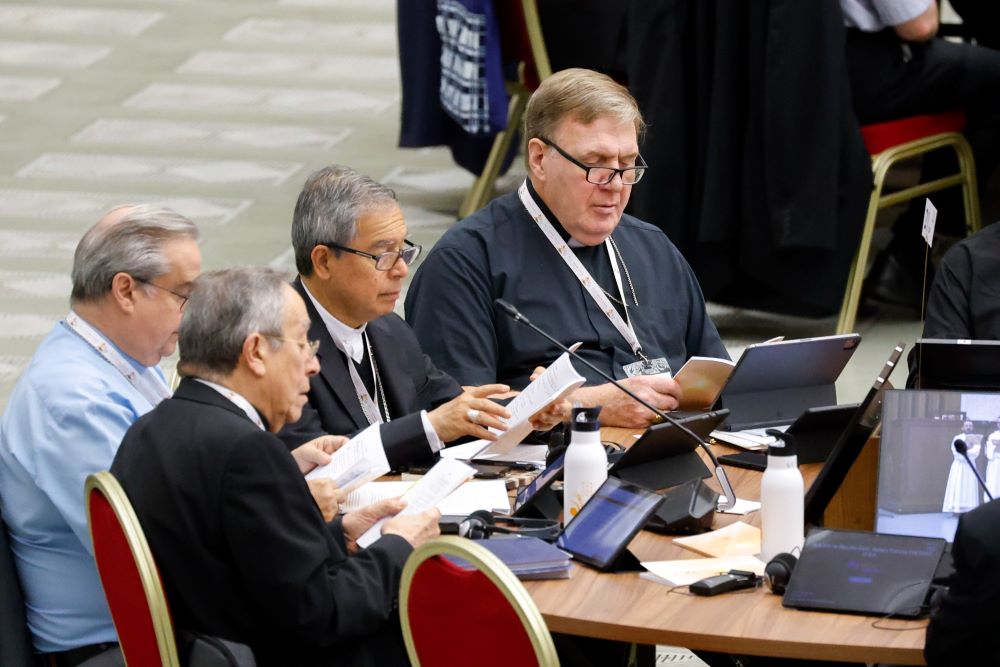
Cardinal Joseph Tobin of Newark, New Jersey, (right) prays before a working session of the Synod of Bishops at the Vatican Oct. 26, 2023. Tobin, former superior general of the Redemtorists, met Dominican Fr. Timothy Radcliffe when both were appointed to the Synod on Oceania in 1998. (CNS/Lola Gomez)
American Cardinal Joseph Tobin, who first met Radcliffe in Rome when they were both appointed to the Synod on Oceania in 1998, recalled his own time living in Oxford after finishing his second term as superior general of the Redemptorists.
"If Timothy was preaching, I'd make it a point to sit in the back pew and just listen," he said.
On one occasion, he remembers seeing Radcliffe washing dishes after dinner. "Isn't religious life beautiful?" Tobin said to him at the time. "One minute you're a peacock and the next minute you're a feather duster."
The two former heads of global religious orders shared a laugh in the moment, but Radcliffe later told Tobin it had provided him with helpful material for spiritual meditation.
In the two decades since Radcliffe's time as master, the order has attracted increasingly more conservative membership. According to Alison, many younger Dominicans "would like to free the order from the influence of Radcliffe."
"His election as master came when Dominicans were fighting back," said Alison, describing a period when a number of prominent members of the order were viewed suspiciously by the court of John Paul II. "But now Timothy is having a resurgence when the order is much more conservative."
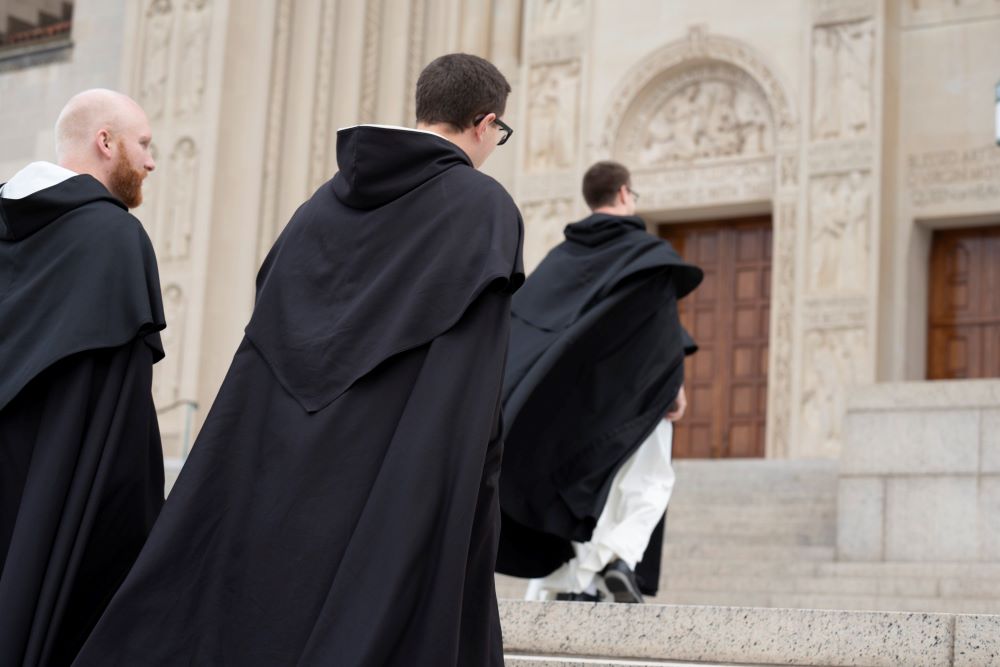
Dominican friars prepare to greet pilgrims during the Dominican Rosary Pilgrimage at the Basilica of the National Shrine of the Immaculate Conception in Washington Sept. 30, 2023. About 3,000 people attended the Mass at the end of a ninth-month novena. (OSV News/Courtesy of George Goss)
But while a prophet may not always be welcome in his own home, he's broadly considered the spiritual leader of many English Catholics, and the demand for him to lead spiritual retreats around the world has only increased.
Since the first session of the synod, Radcliffe has traveled to the United States and Australia and plans are in the works for a visit to Fiji in 2026 — an exacting schedule, which just a few years ago would have been considered unimaginable.
In August 2021, Radcliffe endured a grueling 17-hour operation to treat cancer of the jaw, where several inches of his jaw bone were replaced with tissue and bone from his leg. It was a risky operation that doctors warned could leave him unable to properly eat or speak again.
Radcliffe recounted this experience in a December 2021 essay in The Tablet, where he wrote with vulnerability and candor about making progress that far exceeded his doctors' expectations, while being unsure how much time he might have left.
"There is still a long haul ahead but a corner has been turned," he wrote. "It is time to try to preach again."
Indeed, he has, not least because Pope Francis has given him a megaphone.
'(The) synodal adventure will prove to be deeply transformative of the body of Christ.'
—Fr. Timothy Radcliffe
According to Tobin, Radcliffe's talks at the synod were "uniformly appreciated" by those present in Rome last October.
"He can preach the Gospel in a language that postmodern people can understand while remaining (in) fidelity with the doctrinal treasures of the church," observed the New Jersey cardinal, who was a synod delegate.
"I know that annoyed people in the Vatican at times in years gone by and I said 'no, Timothy is completely faithful but he is trying to speak in a way, much like Paul at the Areopagus,' " he continued. "He's trying to use categories that people understand."
"His emphasis on mercy, inclusion and dialogue are completely consonant with the pope's values," added Tobin. There's now a "much broader appreciation of him including within the Roman Curia."
Advertisement
This new reality — some might even call it a rehabilitation — has even led to speculation that Francis might honor Radcliffe with a red hat by making him a cardinal. While he will soon be over 80 and not have the right to participate in a future papal conclave, he would still be able to take part in the General Congregations — the meetings of all the cardinals about the state of the church that take place before the election of the next pope — a move that would further punctuate his influence on the future of the church.
Radcliffe will not entertain this sort of speculation. His sole focus now is setting the right tone for synod delegates when they return to Rome in October and he reprises his role as retreat master.
So what does he have planned?
"Oh, I don't want to spoil the surprise!" he teased.
"At the first retreat, what I could meditate on is how we can listen and talk to one another," he said. "Now, I think we have to focus on being a synodal church on mission … and that requires that I preach on the resurrection."
Of course, Radcliffe was referring to the Gospels, but one could say that it's an apt description for the synod process itself — a church attempting to be brought back to life again.
"The Holy Father knows the direction in which he wants things to go," Alison said. "And he realizes that Timothy was pushing it in the right direction all those many years ago."

